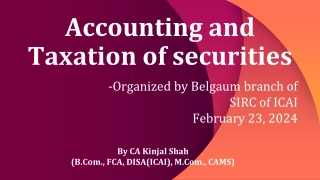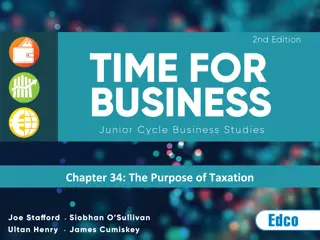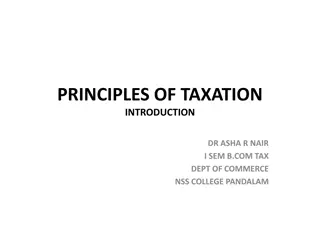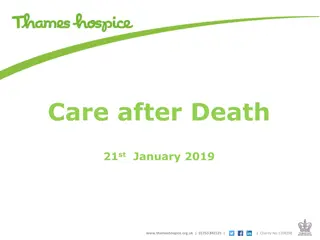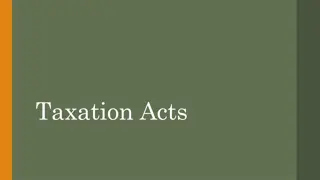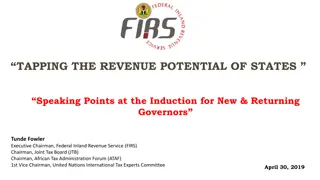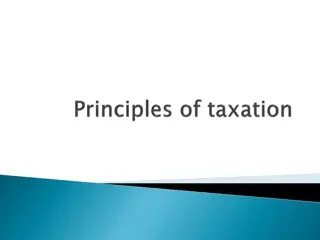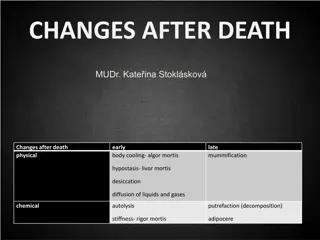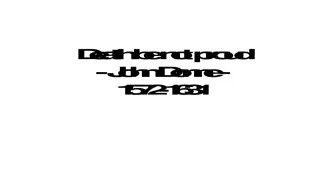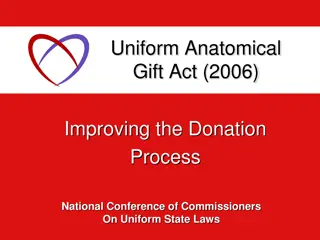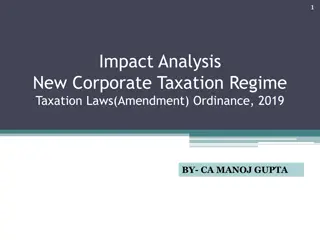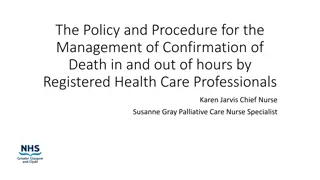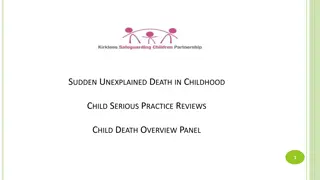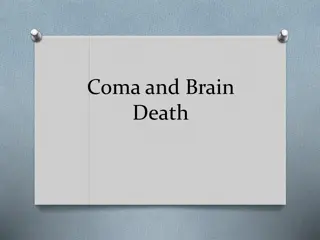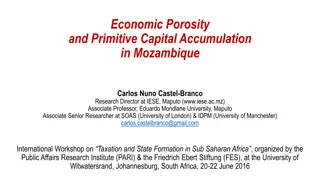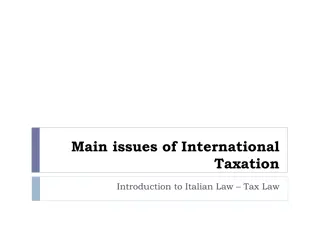Understanding Taxation and Donations Upon Death
Explore the basics of taxation upon death, including deemed disposition of assets, available exceptions, and planning strategies to reduce tax liabilities. Dive into pre and post-2015 donation regulations, rollovers between spouses, and estate freeze techniques. Gain insights into the legalities surrounding donations on death and maximizing estate benefits.
Download Presentation

Please find below an Image/Link to download the presentation.
The content on the website is provided AS IS for your information and personal use only. It may not be sold, licensed, or shared on other websites without obtaining consent from the author. Download presentation by click this link. If you encounter any issues during the download, it is possible that the publisher has removed the file from their server.
E N D
Presentation Transcript
Donations & Death December 22, 2020 Howard Berish FCPA, FCA
AGENDA Taxation on Death Basics Donations on Death (Pre 2016) Donations on Death (Post 2015) Donations from Spousal Trusts Donations in Kind (Quebec)
TAXATION ON DEATH TAXATION ON DEATH General rule: Deemed Disposition of all assets at fair market value at time of death. Resulting capital gains (losses) and full value of RRSPs and RRIFs must be reported on the deceased s final return. Capital losses carryforward and arising in the year of death may be claimed against other income.
TAXATION ON DEATH TAXATION ON DEATH Exceptions: Principal residence. Life insurance proceeds. Anything left to spouse, common law partner or spousal trust.
TAXATION ON DEATH TAXATION ON DEATH Planning to reduce tax on death: Pre-death: Estate freeze & insurance. Testamentary: Bequests to spouse/spousal trust & gifts to charity. Post-mortem: Gifts to charity by estate.
TAXATION ON DEATH TAXATION ON DEATH Rollovers between spouses: Deemed disposition at cost so that no gain or loss is realized. *Unless* deceased s legal representative elects (on an asset by asset basis) to realize certain gains (e.g. where deceased has unused losses or donations). Tax payable by spousal trust on death of surviving spouse. Can choose to pay tax on RRSPs or RRIFs.
DONATIONS ON DEATH PRE 2016 DONATIONS ON DEATH PRE 2016 Donations by will could be used on the deceased s final return or on the return for the year prior to death. Donation limit up to 100% of net income. Donation receipt based on FMV of the property at the date of death.
DONATIONS ON DEATH POST 2015 DONATIONS ON DEATH POST 2015 Graduated Rate Estate (GRE) Estate arising on and as a consequence of an individual s death; Not a trust, but satisfies conditions in The Income Tax Act for a testamentary trust; Not more than 36 months have passed since the date of death; Deceased s SIN is shown on the estate s tax return; Designates itself as a GRE on its first tax return; and No other estate of the individual is designated as a GRE
DONATIONS ON DEATH POST 2015 DONATIONS ON DEATH POST 2015 Benefits of a GRE Graduated tax rates. No obligation to make instalments. Certain exemptions for minimum tax and Part XII.2 tax. May allocate investment tax credits to beneficiaries. Take advantage of tax planning strategies to avoid double taxation. Extended time period to file a Notice of Objection. Greater flexibility on the use of charitable donation credits.
DONATIONS ON DEATH POST 2015 DONATIONS ON DEATH POST 2015 Flexibility for donation tax credit: Donation credit for gifts made by GRE within 36 months of death may be claimed by: Deceased in year of death. Deceased in year prior to death. Estate in year of donation. Estate in any year prior to the year of donation. Estate in any of the five years following the donation.
DONATIONS ON DEATH POST 2015 DONATIONS ON DEATH POST 2015 Flexibility extended to gifts made 37-60 months following death by estate that was a GRE and continues to meet the other GRE criteria. If gift made prior to filing of final tax return receipt donation may be claimed on final return. If gift made after final return is filed, must pay tax without taking into consideration the gift. Any balance of tax not paid is subject to interest (however, see next slide). When gift made after final return is filed, estate must elect to carryback donation to final and a T1ADJ should be filed.
DONATIONS ON DEATH POST 2015 DONATIONS ON DEATH POST 2015 Per CRA for gifts that will be received later you must provide a copy of all of the following: The will; A letter from the estate to the charitable organization that will receive the gift, advising of the gift, a description of the property being gifted and estimated value; A letter from the charitable organization acknowledging the gift and stating that it will accept the gift; Cont. next page
DONATIONS ON DEATH POST 2015 DONATIONS ON DEATH POST 2015 Per CRA for gifts that will be received later you must provide a copy of all of the following: A statement or letter from the legal representative of the estate stating all of the following: The estate is a GRE of the deceased individual and will be designating itself as such; The estate intends to make the gift within 60 months after death; The amount of the gift claimed on the final return of the deceased individual will not be claimed on any other return; For non-cash gifts, the value of the future gift can be reasonably ascertained and supported.
DONATIONS ON DEATH POST 2015 DONATIONS ON DEATH POST 2015 Different planning where asset left to Spousal trust donation may be used by trust to offset tax arising on death of surviving spouse (however, see following slides). Donation of non-cash gift will equal the fair market value of the property at date of donation. Donations made in year of death but prior to death may be used by either spouse. Donations made by the estate after death can only be used by deceased or estate. Donation limit up to 100% of net income.
DONATIONS FROM SPOUSAL TRUSTS DONATIONS FROM SPOUSAL TRUSTS CASE STUDY Assume the following: Mr. A leaves all or part of his estate to a Spousal trust. Assets left to the Spousal trust include assets with a low Adjusted Cost Base (ACB) and a high Fair Market Value (FMV). The terms of the Spousal trust REQUIRES that on the death of the second spouse all or part of the assets of the Spousal trust must go to a named charity or charities. The testator assumed that the tax benefits from the donation would offset all or part of the tax on the capital gain arising on the deemed disposition of the assets at the time of the second spouse s death.
DONATIONS FROM SPOUSAL TRUSTS DONATIONS FROM SPOUSAL TRUSTS CASE STUDY Continued: THE PROBLEM THE PROBLEM: : It is the CRA s legal interpretation that where the original testator REQUIRED the spousal trust to make the donation, it is not, in law, a donation. The charity would be considered a beneficiary. The Spousal trust did not have a charitable intent, the gift was not made gratuitously, and therefore as per CRA it is not a donation. No tax benefit will be realized from the amount left to charity and the Spousal trust will have to pay tax on the capital gains from the deemed disposition.
DONATIONS FROM SPOUSAL TRUSTS DONATIONS FROM SPOUSAL TRUSTS CASE STUDY Continued: THE SOLUTION THE SOLUTION: : The terms of the Spousal trust should provide the trustees with the RIGHT , but not the obligation, to make the donation at their discretion. The original testator may leave a Letter of Wishes or a similar document to the trustees specifying his/her charitable wishes, but this is not binding on the trustees.
DONATIONS FROM SPOUSAL TRUSTS DONATIONS FROM SPOUSAL TRUSTS Sample Wording for Bequest: My EXECUTORS, at their absolute discretion shall have the right to make donations to a Canadian registered charity or charities to a maximum amount of assets having a value of ($xxx,xxx.xx) or such lesser amount.
DONATIONS IN KIND DONATIONS IN KIND - - QUEBEC QUEBEC Prior to 2016 it was generally accepted that the tax benefits from making a donation could be claimed by either spouse, regardless of the actual donor (administrative policy). Effective 2016, Federally this administrative policy was made law so taxpayers no longer have to rely on administrative discretion. MRQ did not harmonize with the Federal change. MRQ s administrative policy does not apply to Gifts In Kind. does not apply to Gifts In Kind. Gifts In Kind can only be claimed by the actual donor. With the proliferation of gifts In Kind, particularly marketable securities, including flow through mining shares, professionals and their clients should keep this Made In Quebec policy in mind.
Questions? Thank You!



